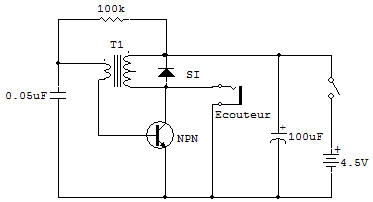

Capacitors and Oscillators

We've used audio oscillators in earlier projects like Earsplitier and Electronic Safecracking see Oscillator Section.
Capacitors play an important part in oscillator operation ... as in this Project.
After you finish the wiring connections, connect the Earphone and press down on the Key. You'll hear a sound through the Earphone.
Now release the Key, What do you hear?
You'll still hear the sound even though the Key is not being pressed. But as you continue to listen you'll notice that the frequency of the tone becomes lower. After a few more seconds the tone will stop. Can you guess why this happens? (Ah, c'mon By now you've got IQ know the answer!)
The 100 uF capacitor is charged when the Key is pressed. When the Key is released, the capacitor discharges and releases enough electricity to keep the oscillator going for a few seconds until it is discharged. (It's really simple, isn't it?)
There's another function capacitors have is oscillators that we haven't yet mentioned. But try this substitute a 10 uF capacitor for the 100 uF and change the 0.05 uF capacitor to 0,1 uF. What happens to the sound of the oscillator and how long it operates, after the Key is released?
Try other values in place of the 0.05 uF capacitor. What happens to the sound?
What does this tell you about how capacitors affect oscillator operation?
Be sure to keep notes of your results, they'll be handy later when you want oscillator circuits to do certain things.
